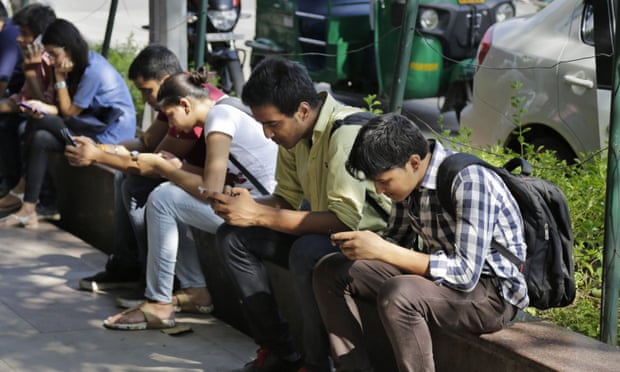- UID
- 20
- Online time
- Hours
- Posts
- Reg time
- 24-8-2017
- Last login
- 1-1-1970
|
Survey of young people shows traditions surrounding caste and hierarchy falling by the wayside as technology redefines attitudes.

▼ People in New Delhi use their mobile phones. A survey of social attitudes among 18- to 35-year-olds reveals a liberal mindset among young people in India. Photograph: Altaf Qadri/AP
Greater openness to intercaste marriage and an increased willingness among men to help with wedding costs point to the emergence of a more liberal generation in India, a study of young people’s attitudes in the country has found.
A “pulse of the nation” survey of 130,000 18- to 35-year-olds, carried out by Inshorts, a news app that has been downloaded by 10 million Indians, found 70% were happy with marriages between people of different castes, turning on its head the the country’s entrenched caste hierarchy.
In addition, 70% of men said a woman need not change her name on marriage and 90% that they were ready to split the cost of the wedding – a dramatic departure from the traditional attitude that the bride’s family should pay for everything.
About 84% of women said it didn’t matter if their husbands earned less than them, and only 7% of men said they were uncomfortable with their wife earning more.
“The findings show a new generation emerging with none of the baggage of the old notions of caste or patriarchy or a subservient status for women,” said Azhar Iqbal, CEO of Inshorts, who revealed that the survey was conducted in order to establish whether the views of the millennials employed by the company were reflected in wider society.
The findings appear at odds with the more conservative attitudes common in India about marriage, the role of wives, the privileges and entitlements accorded to men, and the importance of marrying someone of the same caste.
Intercaste marriages remain rare. In an effort to encourage them, many state governments now offer money to couples when one partner is from a low caste or is a Dalit (formerly known as untouchable). On 3 July, the Orissa government increased the cash “incentive” from 100,000 rupees (£1,095) to 250,000 rupees.
Hitesh Dhingra, co-founder of dating app TrulyMadly, believes there are two reasons for the enlightened views expressed in the survey. One is that young Indians, as users of the internet and social media, are exposed to new ideas that challenge traditional social mores.
The other is that, as more millennials choose their partners using dating apps and websites, they are more likely to focus on personality and compatibility than caste and religion.
“In an arranged marriage, the parents are going to stick to tradition and to caste considerations,” said Dhingra. “But when young people are out there looking for a partner themselves, then the criteria change. Caste, religion, and income are not uppermost. It’s the person’s personality and behaviour that are important. The whole approach becomes more open-minded.”
In a previous Inshorts survey on attitudes towards live-in relationships, 80% of the 140,000 respondents supported the concept, with 26% saying they would choose a lifelong live-in relationship.
“What we are seeing are the markers of a new generation that has been shaped by the internet and influenced by attitudes and behaviour they see in developed countries,” said Iqbal.
► Source |
|